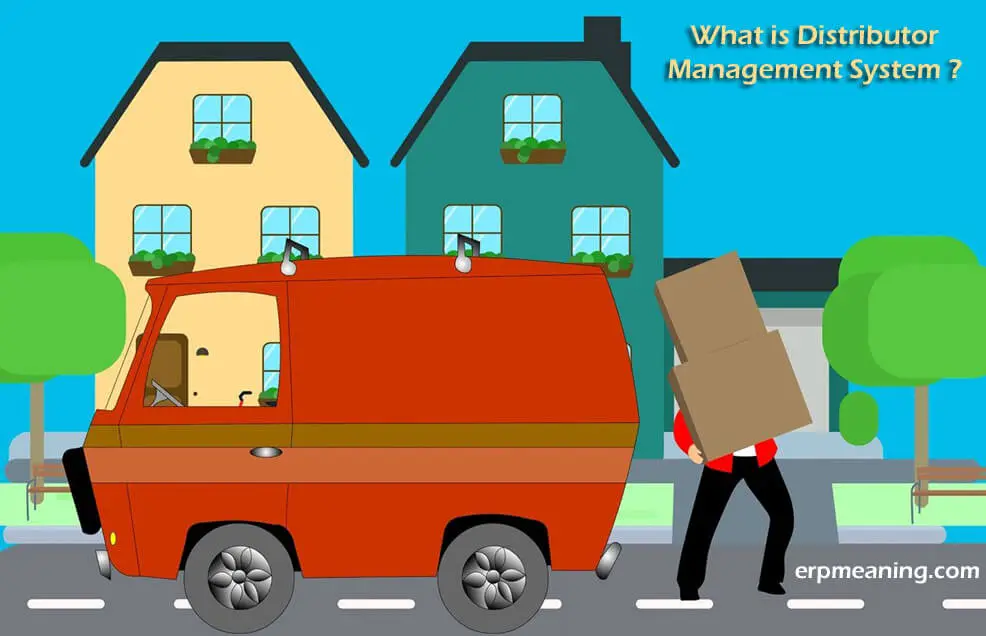
Definition of Distributor Management System?
A Distributor Management System (DMS) streamlines the business processes, maintains supply chain efficiency, solves the issues related to stock-outs and overstocking and companies can access real-time data from distributors.
DMS offers a single platform for managing the complex, often convoluted series of steps it takes to process and deliver goods. Instead of relying on disparate, disjointed software packages, DMS brings all your logistics functions together in a single system.
Meaning of Distributor Management System
Distributor Management System software (DMS) is a fundamental requirement for any company of consumer goods. This acts as a basic component in companies’ route-to-market. They are helpful in maintaining the supply chain between manufacturers and a myriad of Distributors. Some key functions provided by DMS are retail activities, trade promotions, competitive insights inventory, etc.
A DMS in the modern version has the functionality to streamline all distribution workflows and activities, improve the efficiency of the supply chain, eliminate stock-related issues and companies can access real-time data from distributors. The sales and distribution activities can be boosted with the right solution even in a fragmented marketplace.

The Real Need for Distributor Management System Software
To know the exact usage of the Dealer, Distributor Management System, you have to understand the critical challenges that occur through Channel Sales Management in India.
- A number of distributors have their businesses in small and unorganized entities that include inadequate capital and tech infrastructure.
- Multi-brand distributors face difficulty in managing the data for numerous brands.
- Large distributors are unable to collect the proper actionable data and information.
- The consumption of real-time data is low for orders, inventory claims return stockouts, or overstocking.
- The Internet and sub-standard logistics Infrastructures are penetrated within a short limit.
This lack of information management will affect the entire process of the sales pipeline.
What type of Challenges do Manufacturers have to overcome?
Before the implementation of a Distributor Management System (DMS), there are a number of issues that can be discussed below:
- Manufacturers are required to manage a large network of big and small distributors, in order to get the maximum coverage across multiple regions.
- The different levels in a distribution chain, compounding cost, and inefficiency are important for the penetration of rural or special areas that are hard to reach. It is possible that manufacturers may be unfamiliar with distributor operations in these localized areas. Thus they will be unsuccessful in getting appropriate incentives or support.
- Multi-brand distributors may be stuck in the collection of data that Manufacturers require for the distribution of various brands.
- It rapidly creates problems for the manufacturer to know the exact quantity of inventory that is held by the distributor vs. the inventory that has been already sold.
- Thus, it can be problematic for manufacturers to handle the production with limited data and insight. And it may be also challenging for them to know about what’s actually processed in the field.
- The lack of real-time data about orders, inventory, claims, and returns will result in stockouts and overstocking.
- Due to the limited insights, the manufacturers face difficulties in managing Trade Promotions through the Distributors, which comes out as wasted marketing spend.
However, it seems difficult to tackle all these challenges at once. These difficulties are more, especially with the high demand and rapid movement that are the features of the FMCG industry. This proves the importance of cooperation and carefully curated relationships between the Distributor and Manufacturer.
The Business Impact of Distributor Management System Software
With the help of a DMS implementation system, a number of improvements come out as a strong result. Although some will come as a quick performance while others will take some time they definitely result in a larger impact.
Tactical Improvements from DMS
- Control over Distribution Activity: DMS is an effective source that will be helpful for manufacturers to control the Distributor’s MRP. As well, an effective DMS will provide the item alteration, ledger alteration, negative stocks, backdate entries, and others.
- Stock Management: While using a functional DMS platform, you must make sure that there is no loss in the business. Even situations like out-of-stock can be avoided through stock tracking. Stock management moves from the Distributor and visibility of damaged vs. undamaged stock. For this, a minimum amount of stock must be maintained across sales outlets.
- Sales Team Integration: The integration of intelligent, automated software with the Sales Team is precious as gold when it comes to managing the track of the market competition, brand visibility, sales executive visits, and many more. To increase productivity data should be democratized.
Strategic Improvements from the Distributor Management System
- Tangible Achievement with the Measurement of Target: The planning of cohesive sales strategies can be created by seeing the end-to-end information. Long-term utilization of DMS will provide you with a more accurate project and predict growth goals and successes.
- Improve Relationships with Distributors: A better acknowledgment of data insights from the Manufacturer will get clear expectations. Clear expectations and fulfillment of needs within the time will lead to stronger business relationships. Moreover, understanding stock replenishment needs to support a peak level of profit strategies.
- Channel management: You have to understand the performance of Distributors that can be based on an individual level. This will help to track the data of their sales with clear insights and guides about future relationships with manufacturers.
- Time and Energy Re-allocation: The assorted processes like order processing and communication of Distributor sales in real-time decrease the time consumption which can be utilized for more productive tasks. Let’s think about why you spend your valuable time on follow-ups and liaising when a DMS can be an alternative for you.
People also ask for a Distributor Management System
What is DMS in the Supply Chain?
The distribution management system (DMS) is a software system that manages the entire supply chain of your business. It is responsible for the information flow between the different departments in the supply chain and coordinates the workflow of the people in those departments. DMS is a core part of the supply chain management system and is also responsible for the smooth running of the whole supply chain in business.
What are the elements of Distributor Management Software?
The elements of a DMS include Product information systems, warehouse management, inventory control, warehouse management, logistics, transportation, warehousing and distribution, quality, finance, and customer relationship management.
What is distribution management in the power system?
The DMS (Distribution management system) is the software system that keeps track moment of the electricity. It’s the platform that enables power system operators to efficiently and effectively manage the entire process. Also, it helps operators make decisions to ensure the system is balanced and running smoothly. The main purpose of DMS is to make those decisions easier and more efficient.
How does distributor management Software work?
In a nutshell, distribution management software is a platform that helps eCommerce sellers manage their inventory and shipments. It can be used to manage inventory across multiple sales channels and locations and to keep tabs on inventory levels and sales data. Some software also includes tools for processing orders, managing shipping, and creating shipping labels.
Why do distributors need ERP Software?
In today’s business world, distributors who do a good job at managing and distributing their products can differentiate themselves from their competitors. According to a recent study, e-retailers who have distribution management systems in place can expect to see a 35% increase in their annual revenue. The main reason for this, of course, is that they can better manage their inventory and distribution costs.
What is distribution ERP?
Distribution ERP is a specialized form of enterprise software designed to help businesses manage their supply chains. It has the same basic functions as other types of ERP, including accounting, inventory management, and CRM. But instead of focusing on internal processes, distribution ERP focuses on moving products from where they’re made to where they’re sold.
Is it always necessary for software in distribution?
Distribution software is used for a number of reasons, but most of all, they are used to track and manage the shipment of products from a factory to a retailer. This software is specifically designed to manage the distribution and logistics of the product, where it is made, and how it will be sold. ERP is needed for the distribution business for fast-paced software management.
Conclusion
The role of the distributor becomes important through the ongoing product overflow and retail level saturation.
The optimization of FMCG distribution becomes critical through the automation of a distributor management system (DMS). A perfect Distributor Management System can access the distribution of various processes, improving the efficiency of the supply chain. Also, eliminates stock-outs and overstocking and provides complete access to companies for real-time data from distributors.
